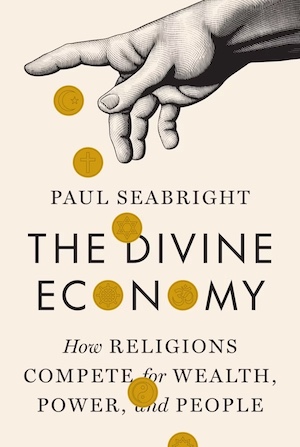Paul Seabright: “The Divine Economy”
Social Science Matrix, 820 Social Sciences Building
Please register to join us on May 1 at 3:30pm for a lecture by Paul Seabright, based on his book The Divine Economy: How Religions Compete for Wealth, Power and People, a novel economic interpretation of how religions have become so powerful in the modern world. Seabright is a British economist working at the Toulouse School of Economics and the Institute for Advanced Study in Toulouse, France.
The talk will be moderated by Duncan MacRae, Associate Professor in the Department of Ancient Greek and Roman Studies at UC Berkeley, where he is also on the faculty of the Graduate Group in Ancient History and Mediterranean Archaeology.
About the Book
Religion in the twenty-first century is alive and well across the world, despite its apparent decline in North America and parts of Europe. Vigorous competition between and within religious movements has led to their accumulating great power and wealth. Religions in many traditions have honed their competitive strategies over thousands of years. Today, they are big business; like businesses, they must recruit, raise funds, disburse budgets, manage facilities, organize transportation, motivate employees, and get their message out. In The Divine Economy, economist Paul Seabright argues that religious movements are a special kind of business: they are platforms, bringing together communities of members who seek many different things from one another—spiritual fulfilment, friendship and marriage networks, even business opportunities. Their function as platforms, he contends, is what has allowed religions to consolidate and wield power.
This power can be used for good, especially when religious movements provide their members with insurance against the shocks of modern life, and a sense of worth in their communities. It can also be used for harm: political leaders often instrumentalize religious movements for authoritarian ends, and religious leaders can exploit the trust of members to inflict sexual, emotional, financial or physical abuse, or to provoke violence against outsiders. Writing in a nonpartisan spirit, Seabright uses insights from economics to show how religion and secular society can work together in a world where some people feel no need for religion, but many continue to respond with enthusiasm to its call.
About the Speakers
Paul Seabright teaches economics at the Toulouse School of Economics, and until 2021 was director of the multidisciplinary Institute for Advanced Study in Toulouse. From 2021 to 2023, he was a Fellow of All Souls College at the University of Oxford. His books include The War of the Sexes: How Conflict and Cooperation Have Shaped Men and Women from Prehistory to the Present, and The Company of Strangers: A Natural History of Economic Life (both Princeton).
Duncan MacRae is an associate professor in the Department of Ancient Greek and Roman Studies at Berkeley, where he is also on the faculty of the Graduate Group in Ancient History and Mediterranean Archaeology. His work examines religion and cultural life in the Roman empire from from the period of the late Republic to Late Antiquity. He is the co-director of the Berkeley Center for the Study of Religion.
Sponsors
Co-presented by the Social Science Matrix and the Berkeley Center for the Study of Religion.
Admission Information
Social Science Matrix is located on the 8th floor of the Social Sciences Building, on the UC Berkeley campus, near Telegraph and Bancroft Avenues, just up the hill from Sather Gate. There are entrances at both ends of the building, but only one of the elevators on the eastern side goes directly to the 8th floor. You can alternatively take the stairs to the 7th floor and walk up the stairs.
If you require an accommodation for effective communication (ASL interpreting/CART captioning, alternative media formats, etc.) or information about campus mobility access features in order to fully participate in this event, please contact Chuck Kapelke at ckapelke@berkeley.edu with as much advance notice as possible and at least 7-10 days in advance of the event.

